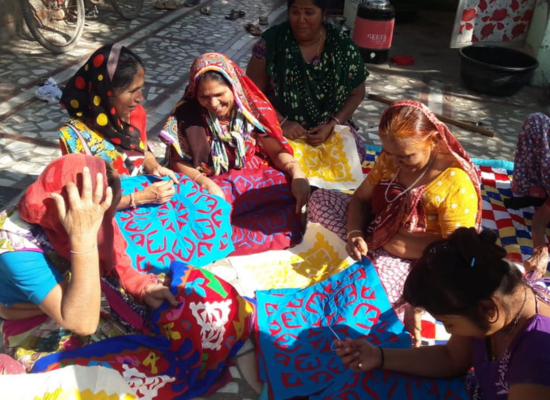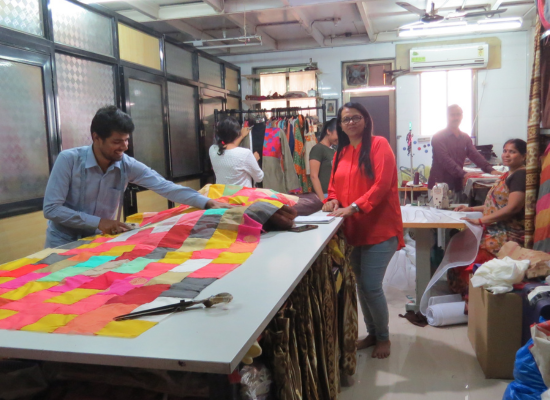Turning junk into art
Fast fashion refers to the rapid production of clothing, often sold at extremely low prices — typically at the expense of garment quality. This trend of constantly available, ever-cheaper apparel comes with significant environmental consequences. Globally, an estimated 57% of clothing ends up in landfills, while about 25% of fashion waste is incinerated, releasing harmful pollutants into the atmosphere. The fashion industry is responsible for approximately 10% of all global greenhouse gas emissions. In just the last five years, clothing sales have doubled, yet the average number of times a garment is worn has dropped by more than a third. This shift has dramatically increased the industry's environmental footprint, raising serious concerns about its long-term sustainability.
Although Bhavini Parikh, now the CEO of Bunko Junko, had long been aware of the fashion industry's waste problem, one moment left a lasting impact. During a visit to a factory, she came across a mountain of beautiful, perfectly usable fabric scraps — all labelled as waste. That experience became a turning point in her journey.
“It was art, just abandoned. That’s when I knew I couldn’t walk away from this”
, explains Bhavini. She became determined to create something that saved both the fabric and the people. Out of pure passion and a deep frustration with the fast fashion waste crisis, Bunko Junko was born in November 2018.
“We saw perfectly good textile scraps being dumped and burned, while artisans and women were looking for meaningful livelihood opportunities. We decided to flip the script”
, elaborates Bhavini. Today, Bunko Junko repurposes pre-industrial offcuts, surplus fabric, deadstock, and textile scraps into unique, high-quality textiles, accessories, and home décor. Founder Bhavini Parikh brings a background in textile design and garment manufacturing, along with over 35 years of hands-on experience working with women artisans and the textile industry. The company operates with a small but dedicated team of five, bringing together professionals from diverse fields — including designers, production experts, and women artisans from low-income communities. United by a shared mission, they combine circular design thinking with grassroots social impact.
The start-up’s name reflects its purpose: Bunko — a Japanese word meaning art, creation, and culture — paired with Junko, a coined term derived from “junk.” The young company quite literally transforms junk into art.
Sustainable by design
On average, about 15% of fabric used in garment production is cut, discarded, and wasted. Bunko Junko addresses this issue by collaborating with textile mills, garment factories, and brands to collect fabric scraps and waste materials. They then design and develop stylish, high-quality fabrics that creatively accommodate the irregular shapes and patterns of these scraps — resulting in truly one-of-a-kind pieces, each distinct from the next. Their production process features multi-layer fabric patching, a method that maintains the structural integrity of the original materials without relying on chemical adhesives or treatments. Instead of using chemical dyes, Bunko Junko preserves the natural colours of the fabric, a practice that eliminates the need for water in the dyeing process. Additional energy-intensive steps are avoided through the use of manual and low-energy techniques such as patchwork, embroidery, and traditional weaving — further reducing the company’s carbon footprint.
“Our mission is to create beauty from textile waste upcycling that is as environmentally conscious and socially responsible as possible and progress toward a new philosophy about what waste really means and how we address it”
, explains Bhavini. Bunko Junko ensures that every bit of post-production material is reused, whether through various forms of patchwork, back-fabric knitting, or the creation of accessories, lanyards, award items, and even paper products. The start-up actively collaborates with interior designers, fashion brands, and corporate partners to introduce upcycled fabric alternatives across industries. This approach not only reduces landfill waste and conserves natural resources but also promotes circularity within the fashion and design sectors.
Beyond sustainability, Bunko Junko creates a strong social impact by empowering women from marginalized communities through skill development and employment, generating meaningful livelihood opportunities. The company also runs awareness programs, workshops, and digital campaigns to encourage responsible consumer behaviour and spread awareness about sustainable fashion.
Globally, only 1% of used clothing is recycled into new garments — a stark indicator of the fashion industry's waste problem. Bunko Junko is committed to changing that statistic. As India’s first textile upcycling manufacturer registered with the Ministry of Textiles, the company is taking a significant step toward transforming the industry and promoting a more circular fashion economy.
Next up at Bunko Junko
Bunko Junko’s current focus is on building strong partnerships with major fashion brands committed to integrating upcycled collections into their offerings. The company also plans to open experiential stores, where customers can touch, feel, and even co-create using upcycled materials. In parallel, they are working to scale their circular hubs globally, bringing sustainable solutions to a wider audience.
Looking ahead, Bunko Junko aims to develop a tech-enabled traceability system that will allow textile scraps to be tracked from source to final product. Their future plans also include expanding into global markets through localized circular hubs and innovating eco-friendly packaging solutions that align with their upcycling mission.
With their innovative approach, Bunko Junko, who joined the ISC3 Global Start-up Service in May 2022, actively contributes to SDG5 (Gender Equality), SDG8 (Decent Work and Economic Growth), SDG12 (Responsible Consumption and Production) and SDG13 (Climate Action).




